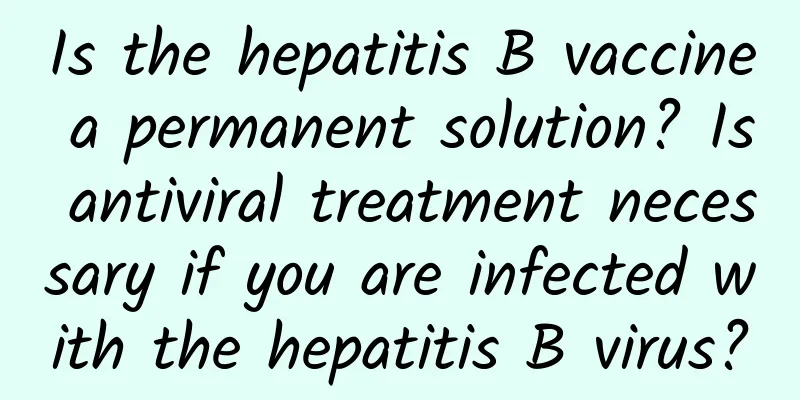Is the hepatitis B vaccine a permanent solution? Is antiviral treatment necessary if you are infected with the hepatitis B virus?

|
Author: Jia Jidong, Chief Physician, Beijing Friendship Hospital, Capital Medical University Reviewer: Wang Linghang, Chief Physician, Beijing Ditan Hospital, Capital Medical University Hepatitis B vaccine has been included in the national immunization program and hundreds of millions of people have been vaccinated, fully demonstrating its safety. Figure 1 Original copyright image, no permission to reprint The child is given one shot within 24 hours of birth, one shot after one month of birth, and another shot after six months of birth. After three injections, more than 90% of the children will produce hepatitis B surface antibodies, which have a protective effect. 1. Is the hepatitis B vaccine a permanent cure? After the hepatitis B surface antibodies are produced, the duration of their presence varies. The higher the level, the longer it lasts, and the lower the level, the shorter it lasts. In terms of antibody levels, it is generally believed that when the antibody reaches 10IU/L or above, it will have a protective effect; if the antibody is lower than this value, the protective effect may not be strong, and a booster shot will be needed to increase the antibody level. There is a theory and a phenomenon that the human body has immune memory, called immune memory. As long as hepatitis B surface antibodies have been produced, even if they have dropped to a very low level, below 10IU/L, when you come into contact with the hepatitis B virus again, you will quickly produce a large amount of antibodies. From this theory, even if the hepatitis B surface antibodies are low, booster injections are not necessarily required. Based on these two statements, we generally give the following advice: for most people, those who do not have special needs or are not in special danger, as long as they have received the hepatitis B vaccine and produced antibodies, they do not need to be overly concerned or overly entangled. It is unnecessary to check antibody levels every year to see whether they need booster shots. For people with special needs, such as patients who need frequent blood transfusions or hemodialysis, or those who have hepatitis B patients at home, or those who need close contact between couples or children and parents, the risk is relatively high. In this case, it is recommended to go to the hospital regularly to test the antibodies. If the antibody is lower than 10IU/L, booster injections are needed. 2. Do children infected with hepatitis B virus need to receive antiviral treatment immediately? Mother-to-child transmission is a very important route of hepatitis B transmission. Although hepatitis B vaccine and hepatitis B immunoglobulin vaccination have been very popular and hepatitis B infection in newborns is rare, due to the large population base in my country, it means that a considerable number of children will still be infected with hepatitis B. If infected with hepatitis B during the neonatal period or infancy, the body will enter the so-called immune tolerance period. To put it simply, the human body and the virus coexist peacefully. The immune tolerance period can be long or short, and it may be broken at a few years old, in the teens, or perhaps in the twenties, thirties, or even forties. Before immune tolerance is broken, the hepatitis B virus basically does not cause damage to the liver. Figure 2 Original copyright image, no permission to reprint Therefore, for children or very young patients, for example, those under 20 or 30 years old, who are hepatitis B surface antigen positive and have a very high virus level, but whose transaminase levels are always normal and whose disease progresses very slowly, the global "guidelines" recommend not treating such patients or children for the time being. Because the human body is in the immune tolerance period, the human immune system does not respond to the virus and does not cause damage to the liver. No treatment is needed. Even if the treatment is not effective, you can just go to the hospital for regular check-ups. When liver function indicators such as transaminase begin to become abnormal and are greater than twice the normal upper limit, other causes should be ruled out, such as taking medicine, fever and cold, which may lead to elevated transaminase. After these causes are ruled out, it is preliminarily determined that it may be related to the virus. The human body may have reacted to the virus and is beginning to prepare to eliminate the virus. At this time, antiviral drug treatment needs to be started to assist the human body in fighting the virus. There are also some children whose transaminase levels do not increase but progress to cirrhosis or even more serious stages, and they need antiviral treatment at this time. Be sure to find a professional pediatrician, infectious disease doctor, or hepatologist, who will inquire about the medical history in a comprehensive and detailed manner, perform physical examinations, laboratory tests, B-ultrasound and other auxiliary examinations, and finally make a judgment as to whether treatment is needed. The use of drugs for children is relatively limited. There are many drugs approved for adults, but relatively few for children. Generally, interferon treatment can be considered for children over two years old, and nucleoside analogs, which are oral antiviral drugs, such as entecavir, can be considered; tenofovir can be considered for children over twelve years old. The specific treatment method and the duration of treatment should be based on the advice and guidance of professional doctors. 3. Will there be side effects for hepatitis B patients taking oral antiviral drugs for a long time? For hepatitis B, long-term oral antiviral drugs are now advocated, which may be several years, decades, or even lifelong treatment. Generally speaking, this type of drug is quite safe, very convenient to take orally, and has no obvious toxic side effects. Of course, each drug is different. Early drug resistance is a big problem. After one, two, three, four, or five years, more than 50 to 60 percent of patients have developed resistance. Once resistance develops, the drug will no longer work. The worst thing is that there is cross-resistance between drugs. Once resistance develops to one drug, it may also affect several other drugs. The "Guidelines" of the World Health Organization and our country recommend highly effective and low-resistance drugs, which some people call third-generation drugs, namely entecavir and tenofovir. The drug resistance of these two drugs is very low, and these two drugs can rescue and replace each other. There is no cross-resistance between the two. One of these two drugs can be preferred. Whether or not to use this drug must be evaluated by a professional doctor. It does not mean that these two drugs can be used if the hepatitis B surface antigen is positive. If there is viral replication, high viral load or load level, high transaminase, liver damage, or clear cirrhosis, it can be used with confidence after being judged by a clinical doctor and meets the indications. Many studies at home and abroad have fully proved that long-term and effective antiviral treatment can reduce the occurrence of cirrhosis and liver cancer. Regular follow-up examinations are required during antiviral treatment. Domestic and international "guidelines" recommend that examinations be conducted at least once every three months to test the level of hepatitis B virus and liver function; alpha-fetoprotein levels should be tested and liver ultrasound should be performed every six months. |
<<: Can Mycoplasma pneumonia be treated with antibiotics such as cephalosporin? Experts say...
Recommend
What to do if a woman has a thin endometrium
Thin endometrium is a very tricky problem for fem...
What gynecological diseases can cause back pain
Gynecological diseases are diseases that occur in...
What is the position between the two breasts?
Symptoms such as pain in the middle of the chest ...
What causes the heart rate to increase during menstruation?
Women's bodies are relatively weak during the...
Pregnancy chest pain comes later than menstrual chest pain
Breasts can be said to be the most important orga...
The four major misunderstandings about allergic rhinitis are the root causes of recurrent rhinitis!
As we all know, allergic rhinitis is most likely ...
What are the causes of heavy bleeding during childbirth?
Natural birth is the most natural way of childbir...
Why is gastric cancer becoming younger and younger?
In the past, when I heard about elders getting st...
How long after giving birth can you wash your hair?
Women should not wash their hair or take a bath t...
How to determine if you have sensitive skin
How to determine if you have sensitive skin? Sens...
Is it possible to get pregnant if you have irregular menstruation?
For women with irregular menstruation, they must ...
New progress! The virus modified by Chinese scientists can accurately and effectively kill cancer cells!
When talking about viruses, most people's fir...
How to enlarge breasts for adolescent girls
Women who want to enlarge their breasts should gr...
Family, you must try baked apples in winter!
Who invented this way of eating... It's so de...
Breast tenderness and pain during lactation
Women have a long breastfeeding period after givi...









